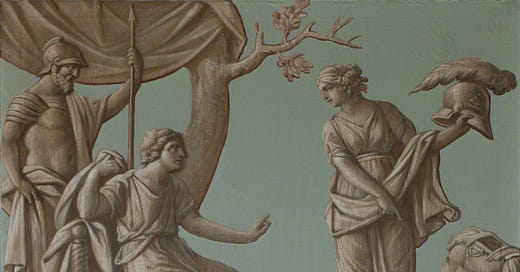In Book XIX of the Iliad, Achilles finally renounces the anger that started the entire story. “I drop my anger now!”1 puts Robert Fitzgerald. I love that translation!
Achilles has only missed three days of actual fighting. That is even though he doesn’t re-enter the battle until Book 19 of 24 books, on day 20 of the events of the Iliad so far, by some counts.2
The first day of battle without Achilles was described in books 3 to 7. It was followed by a couple of days to cremate the dead, and to build walls by the Greek ships.
The second day of battle without Achilles began in Book 8. By the time it ended, the Trojans were camped on the plains instead of returning to the walls of Troy, and it looked like they might break through the ramparts the next day.
That led to Agamemnon sending an emissary begging Achilles to relent, offering many gifts and the return of Brisieis. He turned it down. Since Agamemnon made Achilles give up Brisieis, well then, given her up he has. Including any feeling he may have had toward her, such as a husband might have for a wife, instead of simply a prize. Why shouldn’t he go home, give up on glory, and take a wife from among his own people, whom he won’t be forced to give up?
And now, the third and longest day of battle without Achilles, Book 11 through 18, has ended not just in disaster for the Argives, but also the death of Patroclus. Brisieis he has given up. Returned she may be, but that is over. But for his brother-in-arms, he will have revenge. So now he will give up his anger with Agamemnon.3
Now he fights.
Inspired by the Iliad, Book XIX, lines 56 to 68
Achilles Will Fight We fought over a girl. Given by parents to husband. Given to me by Argives, Widowed, at Lyrnessos’ fall. Better for many had Artemis taken her. But enough of that. No prize. No wife. No long life. Revenge remains and glory. To arms! -- maryh10000
Line 67, Book XIX
νῦν δ᾽ ἤτοι μὲν ἐγὼ παύω χόλον
now but now surely, truly, verily indeed, of a truth I make to end gall, bitter anger, wrath
Robert Fitzgerald’s translation:
Agamemnon, was it better for us in any way, when we were sore at heart, to waste ourselves in strife over a girl? If only Artemis had shot her down among the ships on the day I made her mine, after I took Lyrnessos! Fewer Akhaians would have died hard at enemy hands, while I abstained in anger – Hektor’s gain, the Trojans’ gain. Akhaians years hence will remember our high words, mine and yours. But now we can forget them, and, as we must, forego our passion. Aye, by heaven, I drop my anger now! No need to smolder in my heart forever!
‘Ἀτρεΐδη ἦ ἄρ τι τόδ᾽ ἀμφοτέροισιν ἄρειον ἔπλετο σοὶ καὶ ἐμοί, ὅ τε νῶΐ περ ἀχνυμένω κῆρ θυμοβόρῳ ἔριδι μενεήναμεν εἵνεκα κούρης; τὴν ὄφελ᾽ ἐν νήεσσι κατακτάμεν Ἄρτεμις ἰῷ ἤματι τῷ ὅτ᾽ ἐγὼν ἑλόμην Λυρνησσὸν ὀλέσσας: τώ κ᾽ οὐ τόσσοι Ἀχαιοὶ ὀδὰξ ἕλον ἄσπετον οὖδας δυσμενέων ὑπὸ χερσὶν ἐμεῦ ἀπομηνίσαντος. Ἕκτορι μὲν καὶ Τρωσὶ τὸ κέρδιον: αὐτὰρ Ἀχαιοὺς δηρὸν ἐμῆς καὶ σῆς ἔριδος μνήσεσθαι ὀΐω. ἀλλὰ τὰ μὲν προτετύχθαι ἐάσομεν ἀχνύμενοί περ θυμὸν ἐνὶ στήθεσσι φίλον δαμάσαντες ἀνάγκῃ: νῦν δ᾽ ἤτοι μὲν ἐγὼ παύω χόλον, οὐδέ τί με χρὴ ἀσκελέως αἰεὶ μενεαινέμεν:





This is a powerful rendition of freedom from self-inflicted burdens. Well done!
I think of all the characters in the Iliad and the Odyssey, none were as self-sacrificing as Hector.
To me, Achilles is a spoiled brat. He may have said he was dropping his anger, but he didn't. He just turned it toward the Trojans, and Hector, who was only trying to defend his foolish parents, his wife and child, and home. When he saw Achilles's armor, he attacked knowing he would die but determined to defend his home. I picture his face when he removed the helmet and learned he'd killed Achilles' best friend instead. What horror he must have felt, knowing his doom was upon him. And his wife and child.